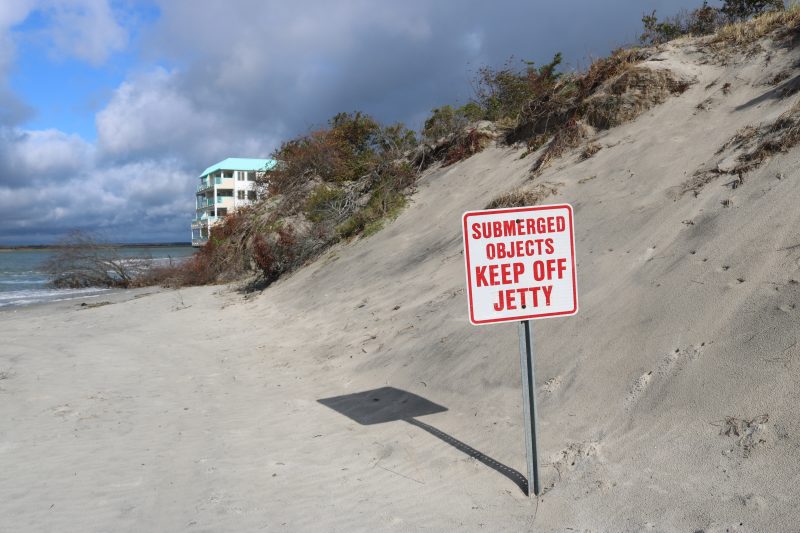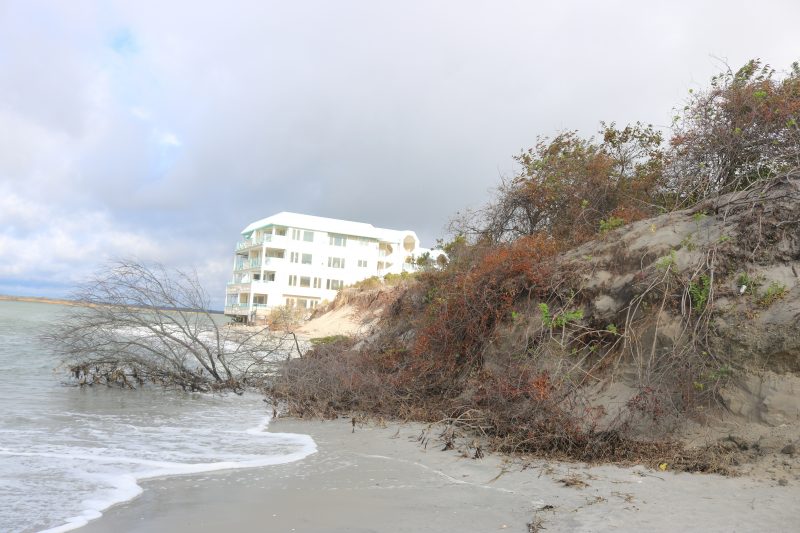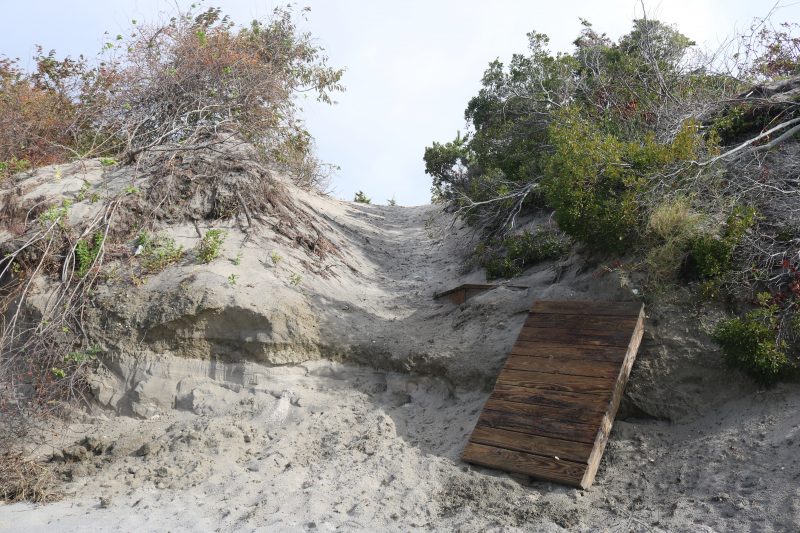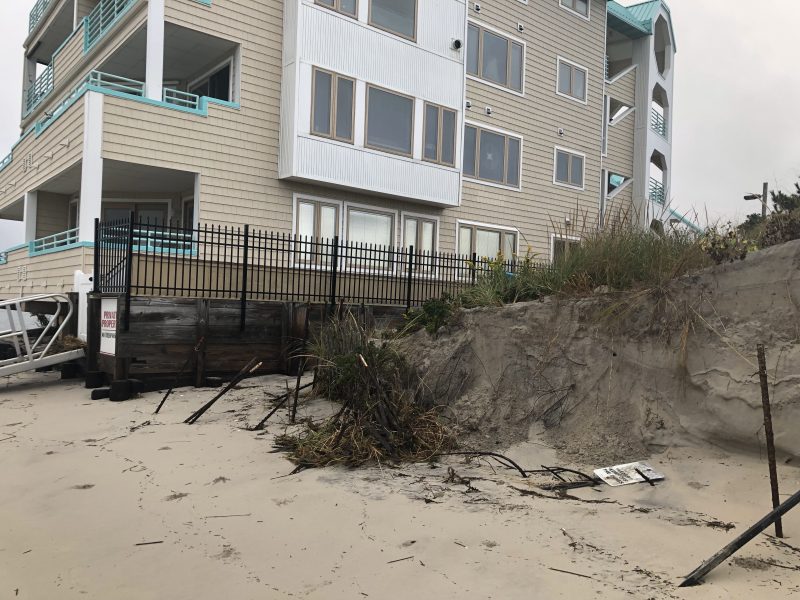The protective sand dune next to the Townsend Shoals condominium complex is being eaten away. (Photo courtesy of Joseph Civitillo)
 By DONALD WITTKOWSKI
Some of the tall trees are standing precariously on the edge of the collapsed dunes, while others have fallen onto the beach below and have since died.
Cliff-like walls of sand created when the dunes collapsed or were sheared away by tidal water from Townsends Inlet now tower 30 or 40 feet high.
What began in the spring involving severe erosion to the beach and dunes on the bay side of the Townsends Inlet Bridge in Sea Isle City continues well into the fall and appears to be getting worse with each passing month.
A top official acknowledged during a City Council meeting Tuesday that Sea Isle doesn’t know how to stop it.
“It’s really a difficult situation because there’s not much we can do,” City Business Administrator George Savastano told the Council members.
For months, Sea Isle officials have been discussing possible ways to slow down or stop the erosion. Now, the city is waiting for help from the U.S. Army Corps of Engineers and the New Jersey Department of Environmental Protection, Savastano explained.
Sea Isle’s city engineer is also studying the erosion problem, he said.
Ultimately, the city hopes to persuade the Army Corps to include the bay side of Townsends Inlet in Sea Isle’s next beach replacement project, which likely won’t be done until 2023 unless the schedule is accelerated to 2022, Savastano said
“They haven’t given us any commitment,” he said of the Army Corps in an interview after the Council meeting.
By DONALD WITTKOWSKI
Some of the tall trees are standing precariously on the edge of the collapsed dunes, while others have fallen onto the beach below and have since died.
Cliff-like walls of sand created when the dunes collapsed or were sheared away by tidal water from Townsends Inlet now tower 30 or 40 feet high.
What began in the spring involving severe erosion to the beach and dunes on the bay side of the Townsends Inlet Bridge in Sea Isle City continues well into the fall and appears to be getting worse with each passing month.
A top official acknowledged during a City Council meeting Tuesday that Sea Isle doesn’t know how to stop it.
“It’s really a difficult situation because there’s not much we can do,” City Business Administrator George Savastano told the Council members.
For months, Sea Isle officials have been discussing possible ways to slow down or stop the erosion. Now, the city is waiting for help from the U.S. Army Corps of Engineers and the New Jersey Department of Environmental Protection, Savastano explained.
Sea Isle’s city engineer is also studying the erosion problem, he said.
Ultimately, the city hopes to persuade the Army Corps to include the bay side of Townsends Inlet in Sea Isle’s next beach replacement project, which likely won’t be done until 2023 unless the schedule is accelerated to 2022, Savastano said
“They haven’t given us any commitment,” he said of the Army Corps in an interview after the Council meeting.
 Trees and bushes are toppling onto the beach below when the dunes collapse.
The Army Corps replenished the beaches on the ocean side of the Townsends Inlet Bridge in 2020. However, the eroded beaches and dunes on the bay side of the bridge were outside the boundaries of the project.
In an interview in September, a spokesman for the Army Corps said the agency has no plans to change the scope of its project to replenish the beach on the bay side of the bridge.
What the Army Corps will do is to share technical data that it gleans from its ongoing surveys of Sea Isle’s shoreline to help the city devise a strategy to protect the beaches and dunes on the bay side, the spokesman said.
So for now, there are no immediate plans to try to repair the damaged dunes and eroded beach.
Sea Isle has been considering a process known as “sand harvesting” as a short-term solution to the erosion. Sand would be taken from healthy areas of the beach and used to repair the damaged dunes.
The city had discussed doing sand harvesting this fall, but at Tuesday’s Council meeting Savastano said it might not happen at all. He said he is worried that any new sand placed on the eroded dunes and beach might simply be swept away by Townsends Inlet.
“We don’t want to do anything if it’s just going to wash it away,” he said in the interview.
Savastano added that the city has not yet ruled out doing sand harvesting or trucking in fresh sand from other areas.
Trees and bushes are toppling onto the beach below when the dunes collapse.
The Army Corps replenished the beaches on the ocean side of the Townsends Inlet Bridge in 2020. However, the eroded beaches and dunes on the bay side of the bridge were outside the boundaries of the project.
In an interview in September, a spokesman for the Army Corps said the agency has no plans to change the scope of its project to replenish the beach on the bay side of the bridge.
What the Army Corps will do is to share technical data that it gleans from its ongoing surveys of Sea Isle’s shoreline to help the city devise a strategy to protect the beaches and dunes on the bay side, the spokesman said.
So for now, there are no immediate plans to try to repair the damaged dunes and eroded beach.
Sea Isle has been considering a process known as “sand harvesting” as a short-term solution to the erosion. Sand would be taken from healthy areas of the beach and used to repair the damaged dunes.
The city had discussed doing sand harvesting this fall, but at Tuesday’s Council meeting Savastano said it might not happen at all. He said he is worried that any new sand placed on the eroded dunes and beach might simply be swept away by Townsends Inlet.
“We don’t want to do anything if it’s just going to wash it away,” he said in the interview.
Savastano added that the city has not yet ruled out doing sand harvesting or trucking in fresh sand from other areas.
 A pathway leading from Townsends Inlet Waterfront Park to the beach is no longer accessible because the dune has collapsed.
He also mentioned the possibility of building a rock revetment to protect the beach and dunes in Townsends Inlet. A revetment, or rock wall, would be a way to absorb the energy from incoming waves or tidal water to prevent damage to the shoreline.
Savastano noted that a rock revetment or a bulkhead to protect the shoreline might be so large that it would take up the entire beach.
“If you put a bulkhead there, you wouldn’t have a beach anymore,” he said.
In the last several months large sections of the protective dunes overlooking the diminished beach have been eroded by the inlet, bringing trees and bushes that once stood on top of them crashing down in a heap of branches and now-dead brown vegetation.
The trees and bushes are part of the Townsends Inlet Waterfront Park, a tranquil hideaway classified as a maritime forest. The park is considered one of Sea Isle’s most significant natural assets.
The dune erosion is also raising concerns among the owners of the nearby Townsend Shoals condominium complex, a four-story building perched directly over the beach and water on the bay side of Townsends Inlet off 94th Street.
Representatives of the condos appeared at City Council meetings in June and September to express their fear that the erosion may eventually pose a threat to the 24-unit building itself. They urged the city to take action to stop the erosion.
Joseph Civitillo, vice president of the Townsend Shoals condo association, said that the high tides two weeks ago “were very alarming.”
“Two of the trees that I was keeping my eye on came down. Plus the dunes closest to our building further eroded and the water swept up to our kayaks. Also, the high tide left debris on our walkway by the sheds,” Civitillo said in an email to SeaIsleNews.com.
A pathway leading from Townsends Inlet Waterfront Park to the beach is no longer accessible because the dune has collapsed.
He also mentioned the possibility of building a rock revetment to protect the beach and dunes in Townsends Inlet. A revetment, or rock wall, would be a way to absorb the energy from incoming waves or tidal water to prevent damage to the shoreline.
Savastano noted that a rock revetment or a bulkhead to protect the shoreline might be so large that it would take up the entire beach.
“If you put a bulkhead there, you wouldn’t have a beach anymore,” he said.
In the last several months large sections of the protective dunes overlooking the diminished beach have been eroded by the inlet, bringing trees and bushes that once stood on top of them crashing down in a heap of branches and now-dead brown vegetation.
The trees and bushes are part of the Townsends Inlet Waterfront Park, a tranquil hideaway classified as a maritime forest. The park is considered one of Sea Isle’s most significant natural assets.
The dune erosion is also raising concerns among the owners of the nearby Townsend Shoals condominium complex, a four-story building perched directly over the beach and water on the bay side of Townsends Inlet off 94th Street.
Representatives of the condos appeared at City Council meetings in June and September to express their fear that the erosion may eventually pose a threat to the 24-unit building itself. They urged the city to take action to stop the erosion.
Joseph Civitillo, vice president of the Townsend Shoals condo association, said that the high tides two weeks ago “were very alarming.”
“Two of the trees that I was keeping my eye on came down. Plus the dunes closest to our building further eroded and the water swept up to our kayaks. Also, the high tide left debris on our walkway by the sheds,” Civitillo said in an email to SeaIsleNews.com.
 The protective sand dune next to the Townsend Shoals condominium complex is being eaten away. (Photo courtesy of Joseph Civitillo)
The condo board plans to have an engineering firm conduct a survey of the eroded dunes to find out if they pose a threat to the building, which was constructed in 1992.
Submerged stones and a bulkhead help to protect the condos from the inlet. There are also large stones and a wooden bulkhead ringing the bottom level of the condo complex for further protection.
At times, the inlet washes right up to the building and a small ramp that leads to the beach.
Savastano said Townsend Shoals should be all right because the condo complex was built on top of piles that are driven deep into the ground.
“I’m not overly concerned with their structure. But we’re trying to keep an eye on everything with the erosion. The piles should be deep enough,” he said in the interview.
The protective sand dune next to the Townsend Shoals condominium complex is being eaten away. (Photo courtesy of Joseph Civitillo)
The condo board plans to have an engineering firm conduct a survey of the eroded dunes to find out if they pose a threat to the building, which was constructed in 1992.
Submerged stones and a bulkhead help to protect the condos from the inlet. There are also large stones and a wooden bulkhead ringing the bottom level of the condo complex for further protection.
At times, the inlet washes right up to the building and a small ramp that leads to the beach.
Savastano said Townsend Shoals should be all right because the condo complex was built on top of piles that are driven deep into the ground.
“I’m not overly concerned with their structure. But we’re trying to keep an eye on everything with the erosion. The piles should be deep enough,” he said in the interview.